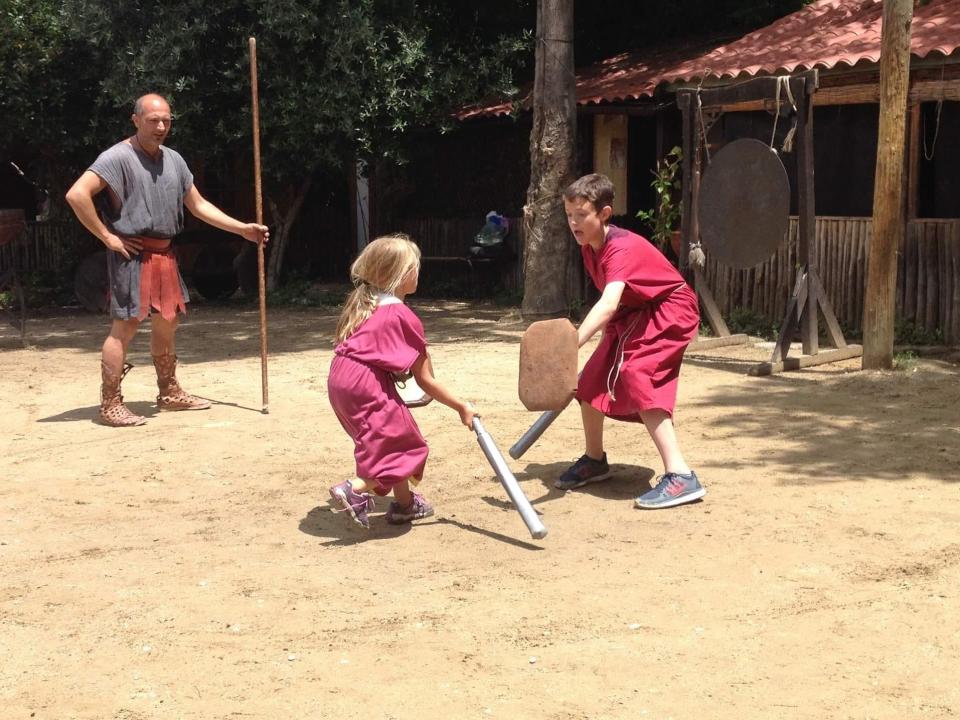Some parents are choosing to 'worldschool' their kids, traveling from country to country in the process

There's no set definition of "worldschooling" because there isn't only one way to do it.
Parents who worldschool their kids say experiential learning is key to this type of schooling.
Families who worldschool shared how they do it.
Colleen Mariotti, originally from Seattle, sold all her belongings in 2013 and applied for dual citizenship in Italy. She and her family relocated there with the intention of starting in Italy and then seeing the world.
After playing at the park, her kids asked to attend an Italian public school. Mariotti was unsure but trusted her kids. She discovered that the process of enrolling wasn't hard.
She listened one evening as they described their first day. They'd followed their teachers to a finely laid dining hall for a multicourse lunch. For an hour they ate and talked. Though her kids spoke no Italian, their classmates still engaged them. The meal opened doors and minds, and the school would remain a positive memory for years to come.
Mariotti is part of a group of so-called worldschoolers, a subset of a growing group of digital nomads. The digital-nomad lifestyle has been gaining popularity for years but spiked during the pandemic. By one estimate, Forbes reported, the number of digital nomads in the US rose by 50%, to about 11 million, in 2020.
Worldschooling is a digital-nomad lifestyle for families. And for many, this lifestyle began long before the pandemic.
You can adapt it to your needs
Worldschooling has no set definition because there's no single way to do it. Some families travel nonstop, becoming digital nomads like the Mariottis. Others worldschool from a base, renting out their house while they travel, or travel only part time.
Travel is just one component of the philosophy. There's no set way to educate kids on the road either, but families share a belief that kids can learn directly from the world around them.

Experiential learning is key to worldschooling. Study history where it happened. Learn cultures, languages, and more directly from others. Visit castles, pyramids, rainforests, temples, deserts, and glaciers as part of a global classroom. And through the power of the internet, develop friendships on multiple continents.
Many families on the road primarily homeschool their kids or use online curricula. Others hire teachers to travel with them or hire tutors in each nation they visit. Others join "hubs" of worldschoolers, where kids can learn together. And others enroll their kids in schools around the world.
Kelly Malahy Rusch, a parent of three elementary-school-aged kids, prefers international schools to public ones. Her children have attended schools in India, the United Arab Emirates, and Indonesia. Rusch and her husband offset the tuition by teaching at the schools themselves — the parents learn the culture while the kids gain an international perspective for free.
There are challenges
While some families who worldschool spend months or years in one location to immerse themselves, others move from place to place to experience living in as many nations as possible. For those fast travelers, making friends and establishing routines can be a struggle.
Alanna Gallo, a former public-school teacher in the US, left in search of a better educational system for her own children. But she said she withdrew her students from a school they attended in the Dominican Republic after a week over concerns that they were unsupervised. Then, while they were still settling in, two of her children became ill, and she had to wrestle with healthcare in a foreign environment. She found a forest school her kids thrived in, and, later, a Montessori school in Greece.
With no mortgage or utility costs — and usually far less stuff — the cost of living for some worldschoolers can be low, especially compared with owning a home in a wealthy nation such as the US.
Mariotti has been traveling for eight years. In an ashram in Indonesia, her children volunteered as English teachers. Her oldest, age 12, said: "I think there are teachers around every corner of this world. I have never learned more from anyone than I have from these kids, and I was the one who was supposed to be teaching." The children attended a full-moon ceremony on their final day in Bali.
For these kids, and many others, the world truly is their classroom.
Christopher Mannino is an at-home dad, author, and freelance writer. He writes fantasy books for children and adults and lives in Delaware.
Read the original article on Insider

